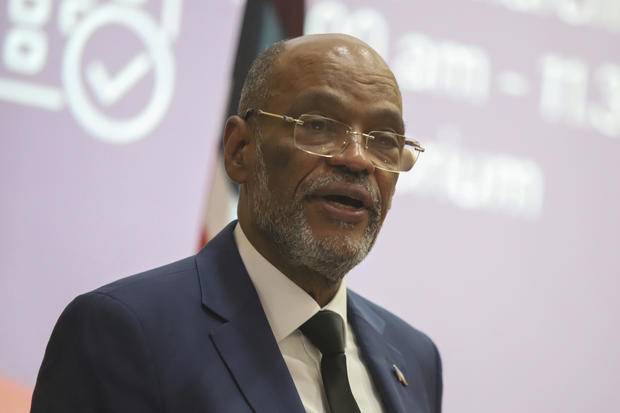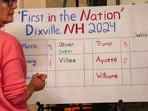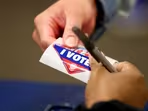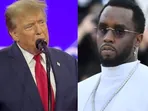What is happening in Haiti? Here's what to know.
Criminal gangs more powerful that Haiti's state security forces have attacked prisons and the airport serving the country's capital, forcing businesses and schools to close and driving an estimated 15,000 people from their homes in Port-au-Prince.
The U.N.'s top human rights official warned Wednesday that the situation in Haiti was "beyond untenable," noting that more than 1,190 people had been killed since the start of 2024 alone. But the chaos and bloodshed started long before that in the small, deeply impoverished Caribbean nation, and international efforts to send help have thus far gone nowhere.
U.N. High Commissioner for Human Rights Volker Turk called for the urgent deployment of a multinational security force to back up Haiti's beleaguered police and military, saying there was "no realistic alternative available to protect lives."
Below is a look at major recent developments, and how the country less than 700 miles from U.S. soil descended into chaos.
What's happened recently in Haiti?
The latest episode of major violence flared up on Feb. 29 as Prime Minister Ariel Henry flew to Kenya to push for the U.N.-backed deployment of a police force to help fight the gangs.
Heavy gunfire echoed across the capital as prominent gang leader Jimmy "Barbecue" Cherizier announced that his group, G9, was joining forces with other gangs to force Henry to step down.
Finance Minister Patrick Boivert, serving as Haiti's acting prime minister in Henry's absence, declared a state of emergency on March 3 and said officials were imposing an evening curfew to "take appropriate measures in order to regain control of the situation."
On March 5, with Henry still in his role, though not in the country, Cherizier warned that if the premier didn't resign and "if the international community continues to support him, we'll be heading straight for a civil war that will lead to genocide."
"Either Haiti becomes a paradise or a hell for all of us. It's out of the question for a small group of rich people living in big hotels to decide the fate of people living in working-class neighborhoods," Cherizier said, in a possible reference to the emergency U.N. Security Council meeting taking place in New York about his country's fate.
Where is Haitian Prime Minister Ariel Henry?
Amid the mounting pressure to step down, Henry has not been able to return to Haiti. Before flying to Kenya, he was in the South American country of Guyana for a summit held by a regional trade bloc known as Caricom, where Haiti was high on the agenda.
Henry landed in Puerto Rico late on the afternoon of March 5 after his plane was denied permission to land in the neighboring Dominican Republic, where officials have closed the airspace to and from Haiti. Héctor Porcella, director of the Dominican Institute of Civil Aviation, told reporters the plane did not have a required flight plan.
A Caribbean official told The Associated Press on March 6 that leaders of Caricom had spoken with Henry the previous evening and presented several alternatives to end the deepening crisis, including his resignation, which Henry refused.

Asked that same day if the U.S. government had urged Henry to step down, U.S. Ambassador to the United Nations Linda Thomas-Greenfield would say only that the Biden administration had asked him to "move forward on a political process that will lead to the establishment of a presidential transitional council that will lead to elections."
"We think that is urgent — that it's urgent that he moves forward in that direction and starts the process of bringing normalcy back to the people of Haiti," she said.
Other Haitian politicians have started forming alliances with the aim of leading the country in Henry's absence. One new political alliance involves former rebel leader Guy Philippe and ex-presidential candidate and former Sen. Moïse Jean Charles, who told Radio Caraïbes on Wednesday that they signed a deal to form a three-person council to lead Haiti.
Henry has not made any public comment since the gangs laid siege to critical infrastructure sites late last week while he was in Kenya.
How did things get so bad in Haiti?
Government corruption is at the root of Haiti's long-standing instability. The small nation has grappled with violent political unrest for 20 years, but powerful earthquakes in both 2010 and 2021 did nothing to help ease the difficult lives of residents. The 2010 disaster was one of the deadliest earthquakes ever, killing roughly a quarter of a million people and devastating the island's already weak infrastructure.
The latest round of attacks began in late February after Henry pledged to hold long-awaited general elections, but not until mid-2025. He'd been due to step down voluntarily by February but declined to do so, infuriating many Haitians and sparking the gangs' uprising.
The current crisis can be traced directly back to 2021, however, when then-Prime Minister Jovenel Moïse, who was facing a mounting economic and political crisis as he led the country by decree and without a democratic mandate was assassinated.
Henry was sworn in as prime minister soon after with the backing of the international community, but his authority was never cemented as Haitians continued to grapple with soaring prices and crumbling infrastructure.
The country has failed to hold parliamentary or general elections for years and currently has no elected officials.
Who is Jimmy "Barbeque" Cherizier?
Cherizier is leader of a gang federation known fully as G9 Family and Allies. He used to be an elite police officer before taking up arms against Haitian authorities.
Cherizier has previously launched massive attacks that have crippled the country.
In late 2022, he seized control of an area surrounding a key fuel terminal in the capital of Port-au-Prince for almost two months.
How many gangs are there and how powerful are they?
An estimated 200 gangs exist in Haiti, with 23 main ones believed to be operating in the metropolitan area of Port-au-Prince.
Until recent years, they controlled some 60% of the capital, but that area has since grown to about 80%, according to U.N. officials.
Smuggled firearms and ransom payments to kidnappers have enabled the gangs to become more financially independent. That's increased their power as the state has weakened, and an underfunded and under-resourced police department has been unable to contain them.
"Present-day gangs enjoy a much higher degree of military capacity than those a decade ago," according to a recent report by the Global Initiative Against Transnational Crime. "This has largely been driven by the gangs' ability to acquire high-caliber weapons."
The organization said the gangs' acquisition of such firearms had "completely transformed the ecosystem of violence in the country."
A 2023 U.N. report stated that recovered weapons destined for Haitian ports included ".50 caliber sniper rifles, .308 rifles, and even belt-fed machine guns."
- In:
- War
- Haiti
- Crime
Disclaimer: The copyright of this article belongs to the original author. Reposting this article is solely for the purpose of information dissemination and does not constitute any investment advice. If there is any infringement, please contact us immediately. We will make corrections or deletions as necessary. Thank you.
Title:What is happening in Haiti? Here's what to know.
Url:https://www.investsfocus.com







